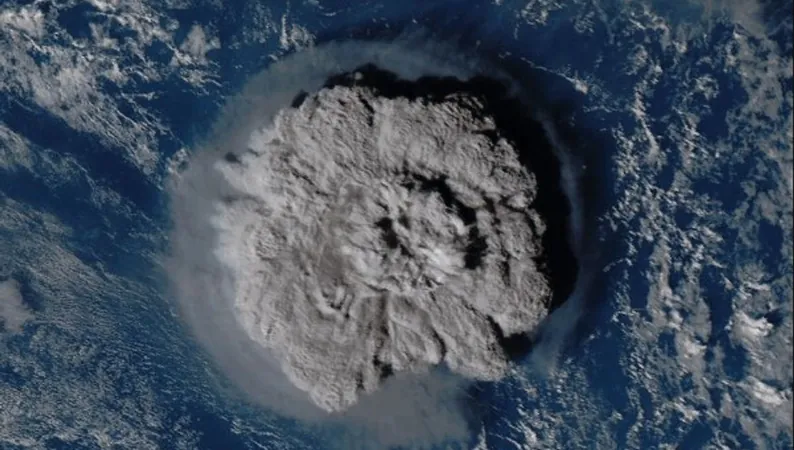
Tonga Volcano Eruption: An Explosion Comparable to Five North Korean Nuclear Bombs Shocks the World
2024-10-03
Tonga Volcano Eruption: An Explosion Comparable to Five North Korean Nuclear Bombs Shocks the World
The colossal underwater eruption that rocked the waters off the coast of Tonga on January 15, 2022, has finally found its explanation—one that is both surprising and alarming. Research has unveiled that the eruption originated from a unique geological process, distinct from the typical volcanic activity associated with such events.
In a groundbreaking study, researchers have determined that the eruption was triggered by a powerful explosion caused by gas-compressed rock beneath the ocean. Jinyin Hu, one of the authors of the study, commented, "Our findings confirm there was an explosion, possibly due to a gas-compressed rock, which released energy akin to five of North Korea’s most powerful underground nuclear tests conducted in 2017."
The eruption of the Hunga Tonga-Hunga Ha’apai volcano was so intense that it not only created a massive volcanic plume but also produced one of the loudest sounds ever recorded on Earth. The force of the eruption even penetrated the atmosphere, resulting in the formation of a new hole in the ozone layer—a staggering event that highlights the power of nature's fury.
Scientists had long been puzzled by the sheer magnitude of the eruption, given the vast amounts of seismic data that followed. To unravel the mystery, the research team developed a model that integrates several key aspects of this data. One crucial analysis utilized the moment tensor—a measure utilized in understanding earthquake sources—coupled with a force calculation specific to volcanic eruptions.
Their findings indicate that an explosive force originating from shallow waters triggered a dramatic upward displacement of water, which subsequently relieved the immense pressure on the rock layers beneath. As Hu elaborated, “Our model suggests this event resembled an overcooked pressure cooker, with gas-compressed rock trapped under the sea."
Importantly, this revelation challenges the long-held belief that explosive underwater eruptions are primarily driven by the interaction of hot magma and cold seawater. Professor Hrvoje Tkalčić, another contributor to the study, noted, “Initially, we were baffled by the significant vertical force we observed. However, we soon understood that the solid earth rebounded upward as the water column was violently uplifted.”
While the researchers maintain that their model is open to debate, they assert that it provides a plausible explanation for the extraordinary eruption. This study highlights not only the necessity for further exploration into volcanic activities but also serves as a reminder of the unpredictable and potentially catastrophic power of nature.
Stay tuned, as this discovery could reshape our understanding of volcanic eruptions and their connections to geological phenomena, emphasizing the importance of continued research in one of nature's most powerful displays!





 Brasil (PT)
Brasil (PT)
 Canada (EN)
Canada (EN)
 Chile (ES)
Chile (ES)
 España (ES)
España (ES)
 France (FR)
France (FR)
 Hong Kong (EN)
Hong Kong (EN)
 Italia (IT)
Italia (IT)
 日本 (JA)
日本 (JA)
 Magyarország (HU)
Magyarország (HU)
 Norge (NO)
Norge (NO)
 Polska (PL)
Polska (PL)
 Schweiz (DE)
Schweiz (DE)
 Singapore (EN)
Singapore (EN)
 Sverige (SV)
Sverige (SV)
 Suomi (FI)
Suomi (FI)
 Türkiye (TR)
Türkiye (TR)